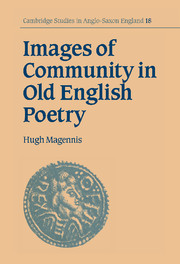Book contents
- Frontmatter
- Contents
- Acknowledgements
- List of abbreviations
- 1 Introduction: ideas of community and an Anglo-Saxon audience/readership
- 2 Hall and city, feasting and drinking: images of communal life
- 3 Hall and feasting in Beowulf
- 4 Hall and feasting: transformations and alternative perspectives
- 5 Personal in conflict with communal
- 6 The mythic landscape of Beowulf: sea, stronghold and wilderness
- 7 The dwelling-places of God's people: place and setting in biblical poetry
- 8 Places of trial and triumph in hagiographical poetry
- 9 Conclusion: community and power in later poetic and other texts
- Bibliography
- Index
7 - The dwelling-places of God's people: place and setting in biblical poetry
Published online by Cambridge University Press: 14 August 2009
- Frontmatter
- Contents
- Acknowledgements
- List of abbreviations
- 1 Introduction: ideas of community and an Anglo-Saxon audience/readership
- 2 Hall and city, feasting and drinking: images of communal life
- 3 Hall and feasting in Beowulf
- 4 Hall and feasting: transformations and alternative perspectives
- 5 Personal in conflict with communal
- 6 The mythic landscape of Beowulf: sea, stronghold and wilderness
- 7 The dwelling-places of God's people: place and setting in biblical poetry
- 8 Places of trial and triumph in hagiographical poetry
- 9 Conclusion: community and power in later poetic and other texts
- Bibliography
- Index
Summary
Following the lead of their scriptural sources, the Old Testament poems composed in Anglo-Saxon England concern themselves most insistently with two types of place and setting, the good landscape and the city. The lead is that of the Bible but the imagery of the good landscape and of the city is considerably extended and developed in the responses of the Old English poets. Since ideas about and settlement are less important in the New Testament than in the Old, it is perhaps understandable that the Old Saxon gospel poem the Heliand, which may be seen as sharing a common tradition with the Old English biblical poems, is largely lacking in description of landscape or cities. G. Ronald Murphy has recently shown how the poet of the Heliand ‘saxonizes’ aspects of the setting of the gospel narrative in terms of weather and land/sea-scape, but the theme of place is not emphasized in the poem. There is also comparatively little interest in place or setting in the Old English Christ and Satan, which concerns itself with New Testament rather than Old Testament themes.
Good landscape receives particular attention in the Genesis text in the Junius Manuscript, especially in Genesis A, where it appears as an image of harmony and prosperity within God's creation. The enjoyment of good landscape is a reflection of the favour of God bestowed on his people.
- Type
- Chapter
- Information
- Images of Community in Old English Poetry , pp. 144 - 167Publisher: Cambridge University PressPrint publication year: 1996



